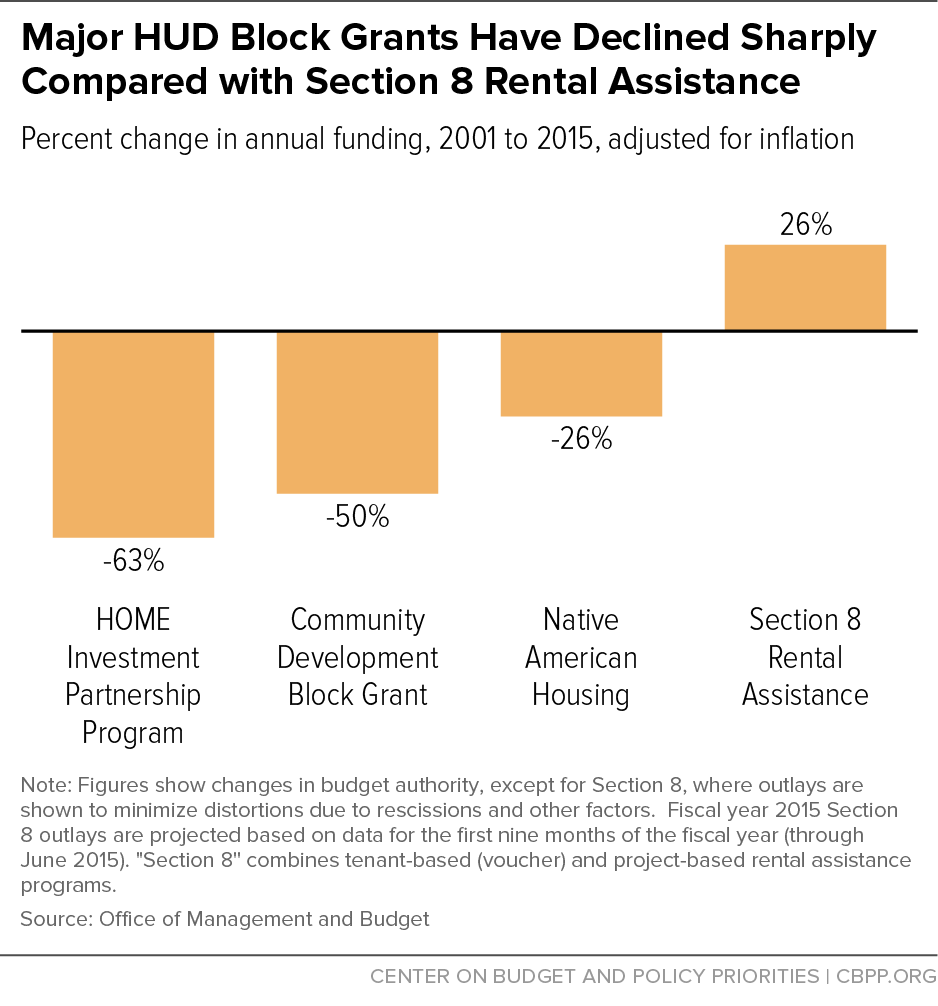más allá de los números
More “Moving to Work” Block Grants Would Mean Fewer Housing Vouchers for Low-Income Families
The Senate Appropriations Committee’s 2016 funding bill for the Departments of Transportation and Housing and Urban Development (HUD) would dramatically expand the Moving to Work (MTW) demonstration program, as we discuss in a new analysis. Although MTW has fostered some useful policy innovations, it’s also had significant adverse effects — and expanding MTW without substantial reforms, as the Senate bill proposes, would pose major risks for low-income families.
MTW allows participating state and local housing agencies to obtain broad waivers of federal laws and rules governing the public housing and Housing Choice Voucher programs, to shift funds from those programs to other purposes, and to receive funding under special block grant formulas.
The Senate bill directs HUD to boost the number of housing agencies participating in MTW more than eightfold, potentially extending it to 35 percent of the nation’s vouchers and public housing units. The bill also would block important reforms HUD plans to make at agencies already participating in MTW.
The risks include:
- Fewer vouchers. The Senate provisions could cause as many as 85,000 fewer low-income households to receive vouchers, if new MTW agencies — like agencies in MTW today — shift large amounts of voucher funds to other purposes. That would bring hardship to low-income families, seniors, and people with disabilities, since research shows that vouchers reduce crowding and housing instability and are by far the most effective way to lower homelessness among families with children. MTW agencies transfer voucher funds for a range of activities, such as program administration, social services, and housing development projects. These activities often have benefits, but they do little or nothing to offset the loss of rental assistance from providing vouchers to fewer families.
-
Risk of future cuts. The provisions could lay the groundwork for even deeper voucher cuts in the future by converting more than 40 percent of voucher funds to block grants, which, as the graph shows, tend to be more vulnerable to funding reductions. For example, the Native American Housing Block Grant — which policymakers established to consolidate funding to Native American tribes and tribal housing agencies for vouchers, public housing, and several smaller funding streams — has lost 26 percent of its inflation-adjusted value since 2001, while Section 8 funding has grown by 26 percent to cover the costs of new vouchers approved by Congress and a growing gap between market rents and the incomes of poor families.
- Rent increases and other risky policy changes. The new agencies admitted to MTW would likely extend — to many additional families — harmful or risky policy changes that are common at agencies now in MTW, including substantial rent increases for the poorest families. The Senate bill also would let the new agencies adopt arbitrary time limits on rental assistance, including for working families who can’t earn enough to afford local housing costs, without requiring an evaluation of these policies’ impact.
Well-designed reforms, such as requirements that participating agencies use most voucher funds for rental vouchers and limits on waivers of key protections for low-income tenants, could lessen MTW’s risks. Unfortunately, the Senate provisions move in the opposite direction by sharply expanding the demonstration while blocking needed reforms.

